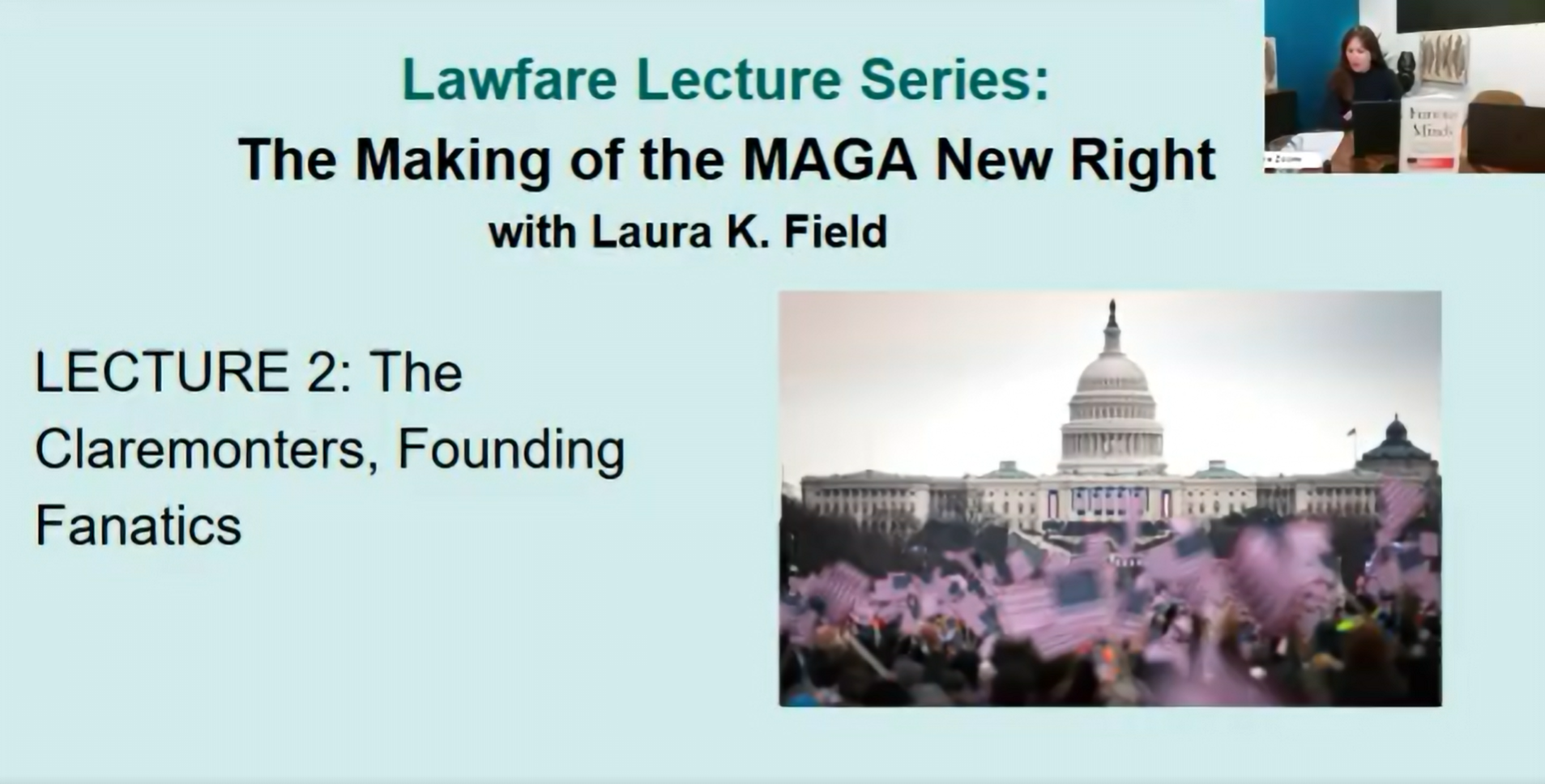The Week That Was: All of Lawfare in One Post
Barely a peep about the Mueller investigation on Lawfare this week, though there was a district court denial of Paul Manafort’s motion to dismiss the special counsel’s criminal charges against him on grounds of improper scope.
Published by The Lawfare Institute
in Cooperation With

Barely a peep about the Mueller investigation on Lawfare this week, though there was a district court denial of Paul Manafort’s motion to dismiss the special counsel’s criminal charges against him on grounds of improper scope.
Quinta Jurecic posted the House intelligence committee’s controversial report on Russian election interference and possible collusion with the Trump campaign. The Democratic National Committee sees things differently: Chinmayi Sharma summarized the DNC’s criminal complaint against the Russians, WikiLeaks, and associates of the Trump campaign, alleging a vast conspiracy to steal and disseminate internal emails during the election. Ingrid Wuerth analyzed Russia’s liability in that suit under the Foreign Sovereign Immunities Act. And to boot, Lisa Monaco and Wayne Williams talked all thing’s election security on Tuesday’s Lawfare Podcast.
Bob Bauer explained that former FBI director James Comey’s new book left Bauer wondering what role Comey believes process should play in ethical leadership. Benjamin Wittes and Scott Anderson wanted to know how the current FBI leadership is doing, so they filed a FOIA request for the FBI internal climate survey.
For the Lawfare Podcast, Susan Hennessey spoke to Bobby Chesney and Scott Anderson about the new draft AUMF in the Senate Foreign Relations Committee.
In response to a New York Times editorial, Chesney pointed out that the AUMF is more limited than the editorial board seems to think.
In this month’s Water Wars, Timothy Saviola and Nathan Swire explained China’s most recent military exercises and geopolitical drama in Vanuatu.
Scarlet Kim, Diana Lee, Asaf Lubin and Paulina Perlin highlighted newly disclosed documents on the history of the “Five Eyes” intelligence sharing arrangement.
Kanzanira Thorington detailed how Trump’s protectionist streak threatens the global trading regime. For the Middle East Ticker, Dana Stuster described Europe’s efforts to bring Trump around on the Iran deal and the Turkish snap election. In other Hilary Matfess argued that Ethiopia needs reforms if its to ward off looming threats to its political and economic successes. And Frederica Saini Fasanotti argued that Libya’s fractured political units might create a window of opportunity for a more stable federal system.
Susan Landau responded to Alan Rozenshtein about the National Academies report on encryption. On the Cyberlaw Podcast, Stewart Baker reports back from the RSA conference.
Mueller might’ve been quiet, but judges had other matters to keep them busy.
Eliot Kim summarized the Supreme Court’s ruling in Sessions v. Dimaya, which invalidated a deportation provision in the Immigration and Nationality Act as unconstitutionally vague.
On Tuesday, the Supreme Court ruled in Jesner v. Arab Bank, a landmark case in Alien Tort Statute litigation that found foreign corporations are immune from liability for involvement in human rights abuses. Chinmayi Sharma summarized the ruling. Samuel Moyn asked whether Jesner forces a rethinking of human rights activists approach to litigation. But Chimène Keitner suggests that reports of the death of the Alien Tort Statute might be premature.
On Wednesday, the Supreme Court heard oral argument in Trump v. Hawaii, the travel ban litigation. Before the argument, Peter Margulies previewed the argument. After attending the hearing, Blackman and Margulies recapped and foreshadowed what comes next. (It sounded like a good day for deference to the executive.)
The Administrative Office of the U.S. Courts said on Wednesday that the FISC rejected a record 26 applications. I posted the report. But David Kris said we shouldn’t read too much into it.
Last week, after the government gave 72-hours notice of its intention to transfer John Doe to a third country, Judge Tanya Chutkan of the D.C. federal district court blocked the transfer. The opinion dropped this week.
Chesney gave his analysis before it came out. The government appealed to the D.C. circuit, which heard argument on Friday. Chesney previewed the argument. Quinta Jurecic had the readout after attending the argument. On the National Security Law Podcast, Chesney and Steve Vladeck talked about Doe and much more:
Meanwhile, a new ruling in the military commission of the 9/11 accused denied a motion to dismiss for lack of personal jurisdiction. Sarah Grant summarized the ruling. In other news at the military commissions, Coleman Saunders noted the new latest developments in the al-Iraqi case.
Phillip Bobbit elucidated the national security implications of a court case on water quality permits.
The Rational Security gang gamed out Gina Haspel’s confirmation battle, the Justice Department inspector general’s referral of Andrew McCabe for possible criminal charges, and the DNC lawsuit in the “Drinking on the Job” edition:
And no break for Zuck either. Evelyn Douek provided a chilling primer on Facebook’s role in the violence and ethnic cleansing in Myanmar. Seamus Hughes asked the perennial question: Who’s responsible for policing terrorist content online? A bit of reporting he does suggests the balance of equities may not be where most people would suspect.
Stephanie Carvin describes Canada’s steps toward offensive cyber operations.
The Lawfare Editors posted an invitation to the next Hoover Book Soiree, where Benjamin Wittes will talk to Amanda Tyler about her new book, “Habeas Corpus in Wartime.”
Carvin reviewed Paul Scharre’s new book on the future of killer robots and other terrifying autonomous weapons.
Blackman argued that the attorney general should retract the Office of Legal Counsel memo endorsing the DACA program.
I flagged Lawfare’s latest job opening: We’re hiring an associate editor, and you or someone you know might be exactly who we’re looking for. Apply soon.
And that was the week that was.



.png?sfvrsn=bd249d6d_5)

